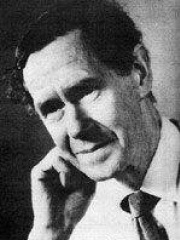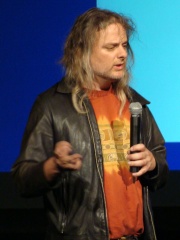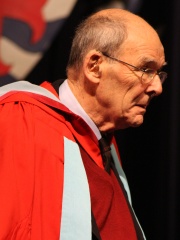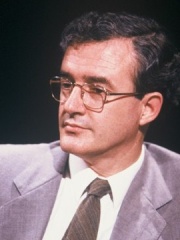




The Most Famous
PHILOSOPHERS from Australia
This page contains a list of the greatest Australian Philosophers. The pantheon dataset contains 1,267 Philosophers, 6 of which were born in Australia. This makes Australia the birth place of the 31st most number of Philosophers behind Syria, and Sweden.
Top 6
The following people are considered by Pantheon to be the most legendary Australian Philosophers of all time. This list of famous Australian Philosophers is sorted by HPI (Historical Popularity Index), a metric that aggregates information on a biography's online popularity.

1. Peter Singer (b. 1946)
With an HPI of 69.31, Peter Singer is the most famous Australian Philosopher. His biography has been translated into 52 different languages on wikipedia.
Peter Albert David Singer (born 6 July 1946) is an Australian moral philosopher who is Emeritus Ira W. DeCamp Professor of Bioethics at Princeton University. Singer's work specialises in applied ethics, approaching the subject from a secular, utilitarian perspective. He wrote the book Animal Liberation (1975), in which he argues for vegetarianism, and the essay "Famine, Affluence, and Morality", which argues the moral imperative of donating to help the poor around the world. For most of his career, he was a preference utilitarian. He revealed in The Point of View of the Universe (2014), coauthored with Katarzyna de Lazari-Radek, that he had become a hedonistic utilitarian. On two occasions, Singer served as chair of the philosophy department at Monash University, where he founded its Centre for Human Bioethics. In 1996, he stood unsuccessfully as a Greens candidate for the Australian Senate. In 2004, Singer was recognised as the Australian Humanist of the Year by the Council of Australian Humanist Societies. In 2005, The Sydney Morning Herald placed him among Australia's ten most influential public intellectuals. Singer is a cofounder of Animals Australia and the founder of the non-profit organization The Life You Can Save.

2. Samuel Alexander (1859 - 1938)
With an HPI of 59.32, Samuel Alexander is the 2nd most famous Australian Philosopher. His biography has been translated into 25 different languages.
Samuel Alexander (6 January 1859 – 13 September 1938) was an Australian-born British philosopher. He was the first Jewish fellow of an Oxbridge college. He is now best known as an advocate of emergentism in biology.

3. J. L. Mackie (1917 - 1981)
With an HPI of 57.76, J. L. Mackie is the 3rd most famous Australian Philosopher. His biography has been translated into 24 different languages.
John Leslie Mackie (25 August 1917 – 12 December 1981) was an Australian philosopher. He made significant contributions to ethics, the philosophy of religion, metaphysics, and the philosophy of language. Mackie had influential views on metaethics, including his defence of moral scepticism and his sophisticated defence of atheism. He wrote six books. His most widely known, Ethics: Inventing Right and Wrong (1977), opens by boldly stating, "There are no objective values." It goes on to argue that because of this, ethics must be invented rather than discovered. His posthumously published The Miracle of Theism: Arguments For and Against the Existence of God (1982) has been called a tour de force in contemporary analytic philosophy. The atheist philosopher Kai Nielsen described it as "one of the most, probably the most, distinguished articulation of an atheistic point of view given in the twentieth century." In 1980, Time magazine described him as "perhaps the ablest of today's atheistic philosophers".

4. David Chalmers (b. 1966)
With an HPI of 56.37, David Chalmers is the 4th most famous Australian Philosopher. His biography has been translated into 33 different languages.
David John Chalmers (; born 20 April 1966) is an Australian philosopher and cognitive scientist, specializing in philosophy of mind and philosophy of language. He is a professor of philosophy and neural science at New York University (NYU), as well as co-director of NYU's Center for Mind, Brain and Consciousness (along with Ned Block). In 2006, he was elected a fellow of the Australian Academy of the Humanities. In 2013, he was elected as a fellow of the American Academy of Arts and Sciences. Chalmers is best known for formulating the hard problem of consciousness, and for popularizing the philosophical zombie thought experiment. Chalmers and David Bourget co-founded PhilPapers; a database of journal articles for philosophers.

5. John Finnis (b. 1940)
With an HPI of 54.98, John Finnis is the 5th most famous Australian Philosopher. His biography has been translated into 19 different languages.
John Mitchell Finnis (born 28 July 1940) is an Australian legal philosopher and jurist specializing in jurisprudence and the philosophy of law. He is an original interpreter of Aristotle and Aquinas, and counts Germain Grisez as a major influence and collaborator. He has made contributions to epistemology, metaphysics, and moral philosophy. Finnis was Professor of Law and Legal Philosophy at the University of Oxford from 1989 to 2010, where he is now Professor of Law and Legal Philosophy Emeritus. He is also the Biolchini Family Professor of Law, emeritus, at Notre Dame Law School and a permanent senior distinguished research fellow at Notre Dame's de Nicola Center for Ethics and Culture. He acted as adviser to several Australian State governments, especially Queensland and Western Australia, mostly on the States' relations with the federal Government and with the United Kingdom. His practice at the English Bar saw him in cases in the High Court and in the Court of Appeal. He is a member of Gray's Inn. He was appointed an honorary Queen's Counsel in 2017. In the 2019 Queen's Birthday Honours for Australia, Finnis was appointed a Companion in the General Division of the Order of Australia, the country's highest civilian honour, for his eminent service as a jurist and legal scholar. He was appointed Commander of the Order of the British Empire (CBE) in the 2023 New Year Honours for services to legal scholarship. He has supervised several doctoral students including U.S. Supreme Court Justice Neil Gorsuch, Justice Susan Kenny of the Federal Court of Australia, Robert P. George of Princeton University, and John Keown of Georgetown University. In 2013 George and Keown summarised some of Finnis's media work as "He has, for example, debated embryo research with Mary Warnock on BBC's Newsnight and with Jonathan Glover in the Channel 4 Debate; discussed euthanasia with a leading Dutch euthanasiast on the same channel's After Dark, and written on eugenic abortion in The Sunday Telegraph".

6. David Malet Armstrong (1926 - 2014)
With an HPI of 54.94, David Malet Armstrong is the 6th most famous Australian Philosopher. His biography has been translated into 19 different languages.
David Malet Armstrong (8 July 1926 – 13 May 2014), often D. M. Armstrong, was an Australian philosopher. He is well known for his work on metaphysics and the philosophy of mind, and for his defence of a factualist ontology, a functionalist theory of the mind, an externalist epistemology, and a necessitarian conception of the laws of nature. Keith Campbell said that Armstrong's contributions to metaphysics and epistemology "helped to shape philosophy's agenda and terms of debate", and that Armstrong's work "always concerned to elaborate and defend a philosophy which is ontically economical, synoptic, and compatibly continuous with established results in the natural sciences".
People
Pantheon has 6 people classified as Australian philosophers born between 1859 and 1966. Of these 6, 3 (50.00%) of them are still alive today. The most famous living Australian philosophers include Peter Singer, David Chalmers, and John Finnis. The most famous deceased Australian philosophers include Samuel Alexander, J. L. Mackie, and David Malet Armstrong.
Living Australian Philosophers
Go to all RankingsPeter Singer
1946 - Present
HPI: 69.31
David Chalmers
1966 - Present
HPI: 56.37
John Finnis
1940 - Present
HPI: 54.98
Deceased Australian Philosophers
Go to all RankingsSamuel Alexander
1859 - 1938
HPI: 59.32
J. L. Mackie
1917 - 1981
HPI: 57.76
David Malet Armstrong
1926 - 2014
HPI: 54.94
Overlapping Lives
Which Philosophers were alive at the same time? This visualization shows the lifespans of the 3 most globally memorable Philosophers since 1700.

